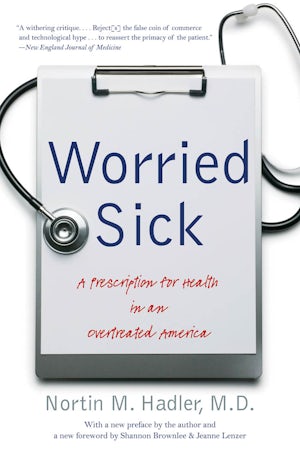Worried Sick
A Prescription for Health in an Overtreated America
Paperback Edition
By Nortin M. Hadler, M.D.
With a new preface by the author and a new foreword by Shannon Brownlee and Jeanne Lenzer
392 pp., 6.125 x 9.25, bibl., index
-
Paperback ISBN: 978-0-8078-7233-8
Published: February 2012 -
E-book EPUB ISBN: 978-0-8078-8271-9
Published: February 2012 -
E-book PDF ISBN: 979-8-8908-4380-7
Published: February 2012
H. Eugene and Lillian Youngs Lehman Series
Buy this Book
- Paperback $29.00
- E-Book $17.99
- Audiobook
For Professors:
Free E-Exam Copies
About the Author
Nortin M. Hadler, M.D., M.A.C.P., M.A.C.R., F.A.C.O.E.M., is professor of medicine and microbiology/immunology at the University of North Carolina at Chapel Hill and attending rheumatologist at UNC Hospitals. He is author of several books, including Stabbed in the Back: Confronting Back Pain in an Overtreated Society and Rethinking Aging: Growing Old and Living Well in an Overtreated Society.
For more information about Nortin M. Hadler, M.D., visit
the
Author
Page.
Reviews
"[Dr. Hadler] is a longtime debunker of much that the establishment holds dear. . . . Reviewing the data behind many of the widely endorsed medical truths of our day, he concludes that most come up too short on benefit and too high on risk to justify widespread credence. . . . Raise[s] serious questions."--The New York Times
"Having guidelines for reimbursement that went through a Hadlerian analysis is not a bad place to start reducing medical care costs without reducing the quality of patient outcomes. A much more politically attractive, and potentially quite effective, reform would make it routine for patients to be exposed to Hadler's kind of analyses whenever they are asked to consider any significant medical intervention."--Journal of the American Medical Association
"A withering critique. . . . [Hadler has] the knowledge, power, and moral obligation to reject the false coin of commerce and technological hype and to reassert the primacy of the patient."--New England Journal of Medicine
"Challenging conventional medical wisdom, [Hadler] advises a healthy skepticism about the benefits of drugs, routine tests, and many common medical procedures. . . . Educate[s] [readers] on being far better health-care consumers. . . . [A] provocative look at the U.S. medical system."--Library Journal
"This book challenges readers to alter their notions about health maintenance, discarding beliefs about the efficacy of certain medications, screening tests, and procedures. . . . This thoughtful message from an experienced medical practitioner has merit and may convince the general public to advocate more forcefully for change."--ForeWord Magazine
"To change unrealistic expectations about longevity or lives without pain or illness bucks vested interests, but that is what Hadler does. . . . He knows that the changes he proposes are a long shot, but when people demand that medicine stop doing unnecessary things well, reform becomes possible. Recommended."--Choice

